- Home
- Steve Rasnic Tem
Deadfall Hotel
Deadfall Hotel Read online
Praise for Deadfall Hotel
Also by Steve Rasnic Tem
Title
Indicia
Dedication
Chapter One: The Funhouse
Chapter Two: Bloodwolf
Chapter Three: The King of the Cats
Chapter Four: The Craving
Chapter Five: In Memory of Heaven
Chapter Six: Phantasmagoria
Epilogue
‘Regicide’ by Nicholas Royle
‘Hell Train’ by Christopher Fowler
Final Image
“In addition to Mervyn Peake’s work, Deadfall Hotel reminds the reader of Ray Bradbury, Edward Gorey, and Shirley Jackson, without being derivative. Far from it, indeed, the novel provides a smorgasbord of sweet spots for the weird fiction connoisseur. Nightmares, supernatural creatures, cults, eccentric characters, and the atmosphere of the titular hotel all combine in a fascinating read… If ever there were a book for a cold winter night by the fireplace, Deadfall Hotel is it.”
– Jeff Vandermeer
“If Franz Kafka, Stephen King, and Edgar Allan Poe somehow managed to collaborate on their worst collective nightmare, I doubt if the details would unsettle us as much as does one reading of Steve Rasnic Tem’s amazing Deadfall Hotel. Many brave readers will check into the Deadfall Hotel; very few of us will depart as the same person we were when we signed in. Steve Rasnic Tem is a rare treasure, waiting to be discovered by many more of the world’s most sophisticated and mature readers of very dark and very deep imaginative fiction.”
– Dan Simmons, World Fantasy Award-winning and New York Times Bestselling author of Hyperion
“If you really need to lose yourself in lush language for a while, to race between mourning and desire and wander the corridors of a hotel where ordinary people just do not stay, then this is the book for you. For me it is a very literary treatment of the uncanny, a much more psychologically satisfying handling of grief and shock and unreal realities than most books of terror will brave.”
– Danel Olson, Professor of English, Lone Star College and editor of the Exotic Gothic anthology series
“As effective as the horror sequences are (and they are – especially the ‘King of Cats’ chapter, which contains one of the greatest chase sequences in the history of horror literature), at the heart of Deadfall Hotel is the story of a father doing everything he can to make life the best it can be for his daughter, and his struggles to protect her from the hotel, its guests, and the fear accompanying her burgeoning womanhood. In all of horror literature, I can think of no other novel that explores parental love as effectively or as deeply.”
– Fearnet.com
Also by Steve Rasnic Tem
NOVELS
Excavation
The Book of Days
Daughters
(with Melanie Tem)
The Man On the Ceiling
(with Melanie Tem)
SHORT STORY COLLECTIONS
Ombres sur la Route (French)
Absences: Charlie Goode’s Ghosts
City Fishing
The Far Side of the Lake
In Concert (with Melanie Tem)
Ugly Behavior (forthcoming)
Celestial Inventories (forthcoming)
POETRY
The Hydrocephalic Ward
AS EDITOR
The Umbral Anthology of Science Fiction Poetry
High Fantastic: Colorado’s Fantasy, Dark Fantasy, and Science Fiction
DEADFALL
HOTEL
by
STEVE
RASNIC
TEM
SOLARIS
First published 2012 by Solaris
an imprint of Rebellion Publishing Ltd,
Riverside House, Osney Mead,
Oxford, OX2 0ES, UK
www.solarisbooks.com
ISBN: (epub) 978-1-84997-353-3
ISBN: (mobi) 978-1-84997-354-0
Copyright © Steve Rasnic Tem 2012
Cover Art by John Kenn Mortensen
Internal Illustrations by D’Israeli
The right of the author to be identified as the author of this work has been asserted in accordance with the Copyright, Designs and Patents Act 1988.
All rights reserved. No part of this publication may be reproduced, stored in a retrieval system, or transmitted, in any form or by any means, electronic, mechanical, photocopying, recording or otherwise, without the prior permission of he copyright owners.
This is a work of fiction. All the characters and events portrayed in this book are fictional, and any resemblance to real people or incidents is purely coincidental.
This one’s for Charlie Grant
Chapter One
THE FUNHOUSE
Deadfall Hotel. A curtain of gnarled, skeletal oak and pine hides it from the rest of the world. The hotel is not well-lit, there is no sign, and night comes early here. The main highway bypassed its access road nearly half a century ago. From the air (and a few private pilots still venture over, out of curiosity) the hotel appears to follow the jumbled line of a train wreck, cars thrown out at all angles and yet still attached in sequence. Additions have been made haphazardly over the years, torn down, rebuilt, fallen into disuse. Repairs have not always been effective. From the back, facing the lake, boarded-up windows, doors, even entire discarded sections may be seen, coated in slightly different shades of paint, constructed of a miscellanea of materials and in a range of styles. But the owners have always tried to maintain a uniform appearance in the front of the hotel, facing the road; they have established facades, like film-sets, over some sections of the structure.
Although the hotel has more than three hundred rooms, fewer than a third are serviceable at any given time. The staff has always been kept small, and the repairs are too many. Systematic repair schedules have been attempted, but time seems to work its destructions at varying rates throughout the rooms, favoring some and wreaking havoc on others, so that projections as to the decline of any one part are virtually impossible. Walking here, you become disoriented to time, place, even spatial relationships. Unless you have a guide. Unless you are of the right frame of mind, or species.
The current proprietor will not bother you; he will want to respect your solitude and, besides, he will have too much else on his mind. Once again, his predecessor has stayed on as caretaker.
The hotel takes its name from the grove. Those who stay here often complain of the trees in their dreams – long, snake-like, involved limbs they imagine must mirror the tree’s root system. Limbs you feel compelled to follow, in and out of shadowed hollows where branches disappear, where nests, newly inhabited or ancient and abandoned, are hidden. In parts of the trees the branches are so interlocked – both within and among individual trees – that the strongest wind will not free them.
Yet when the time comes, and only the grove itself seems to know the secret to this timing (certainly no natural thing; past proprietors have allowed botanists to study the grove, and all have been at a loss to explain its peculiar physics) the branches, the deadfall, fall with rifle-shot sound and abruptness, to join the decades-old clutter layered beneath.
Running such a hotel requires a special calling, or need. There are visitors coming, guests who have nowhere else to go.
– from the diary of Jacob Ascher,
proprietor, Deadfall Hotel, 1969-2000
RICHARD COULD HEAR Serena screaming in the house. He was sure it was her scream, even though there were dozens of other children in there. It was that kind of uneasy scream that could be excitement or terror – impossible to tell, when he couldn’t see her or the exact circumstances. He had the impulse to run in and get her out of that house, but of course that would embarrass her. Serena had rea
ched that age when, more often than not, her father embarrassed her. And unfortunately, he thought, lately her father had become legitimately embarrassing.
She had been reluctant to go into the funhouse at first – she didn’t like the maze of mirrors at the beginning; all those images of herself gave her the creeps, she said. But the rest of it, she said, was “so amazing,” that it was worth being a little scared for a time. He’d been so proud of her then, and a little envious. Sometimes his wise child was far wiser than he.
Richard hated funhouses, haunted houses, horror movies, all that. He’d never understood this impulse people had to be frightened out of their wits. This idea that terror constituted entertainment. He’d always considered that inclination vaguely masochistic. He and Abby used to argue about it all the time. She’d been passionate, acutely intelligent, and perhaps no more so than when arguing the value of what he thought, actually, were lower forms of entertainment: circuses, sideshows, funhouses, horror books and movies. Pale, thin, and beautiful, her body betrayed the strength of her feelings. She would pace, swing her arms, snap her fingers to emphasize some point. He’d be convinced she was angry with him, and then she’d break the mood with a quick, thin-lipped smile that widened her mouth so it made her face almost freakishly lovely. Some days she maintained that smile most of the day, until it began to seem pained, even more so given the crystalline intelligence in her eyes, with their sadness of knowing.
She had loved horror books and movies. She would use words like “cathartic,” and she’d say how important it was sometimes not to look away.
If she had seen her own face in the mirror at the moment of her death, would she have looked away? He had not looked away, and would regret it the rest of his life.
Now all that horror business just irritated him. Kids in Gothic clothing, people laughing about this and that new movie with the latest, grossest effects, books with drippy lettering on the covers, creepy illustrations of faces losing their flesh. People scared from the safety of their armchairs. Laughing their way through the funhouse. None of it real, none of it to be taken seriously. He felt mocked by it all. Theirs was a comfort and an entertainment denied him.
A little girl’s face appeared framed in one of the windows of the funhouse. He couldn’t tell if it was Serena or not. It looked like Serena – the face had Serena’s eyes, her slight, almost nonexistent nose, pale hair so like her mother’s. She screamed at the people milling around outside the house: lounging, waiting for people to come out. Behind her head, red light danced. Her hair suddenly appeared to fan away from her face, rising on agitated air, her head in flames. She screamed as if in agony, and then she screamed again. And then she laughed. Looking directly at Richard, she laughed until she stopped abruptly, as if so exhausted she couldn’t make another sound.
Richard felt thought escape him as if pushed out by some high, nervous wind. His chest seizing, his face hot, he ran into the funhouse entrance, a wide opening framed by painted red lips and crooked yellow teeth. Almost immediately he was assailed by the smells of old popcorn grease and trapped body odor. He pushed at a pink wall for balance, pulling his fingers away when he felt its unsteadiness. The first closet-sized room appeared to be walled in plastic panels of varying degrees of redness and translucency, overlapped and layered so that he was witness to a bewildering display of distant and reflected movement, slices of faces multiplied, legs and arms meeting and crossing, children’s voices shrieking and malformed as audio waves collided. Somewhere in the depths, music pulsed and a revolving light swept the panels, making them dance as if torched and melting. He looked for an edge that would lead him into the next passageway, and a random gleam appeared to suggest a mirrored surface, so he let himself be drawn there, sick to his stomach and angry with Serena for putting him through this.
His first steps appeared to be successful, however, as he immediately found himself inside the beginning of the maze, faced with mirrors in all directions as if inside the dressing room of a nightmare department store.
He took a deep breath to steady himself and attempted to filter through a labyrinth of near and distant sound. Some of it was recorded music, the crank and whir of hidden machinery, threaded through with children’s voices, some younger – as much as he could determine – than Serena’s, some possibly male, some giggling out of control, some – if he wasn’t reading too much into their choked vocalizations – weeping their grief away. But impossible to tell what might be Serena’s sounds, if she were making any sounds at all.
In his attention to sound, he’d let his gaze drop to the floor, which was a fortunate accident as it exposed the geometric patterns of gray tile, well-worn and beginning to separate at the seams, and the places where a mirrored wall made a perpendicular angle with flooring. He had some sense of the beginnings of the maze’s layout now. This first cell was more-or-less six-sided, mirrors arranged at approximately sixty degree angles to one another, a triangular grid. One wall of one triangle was missing, which surely meant that was the way into the next cell of mirrors, and so he made himself step that way, even though to his eyes he appeared to be stepping directly into his own reflection. He saw his other face grimace in anticipation, but he discovered himself successfully through once again, confronted by a multitude of himself, all dumb-faced and sweating.
New music slipped wetly from hidden speakers, accompanied by a steady shifting in the lights from red to orange to green. In the walls his body contorted even as he stood statue-still; it seemed these mirrors were some sort of thin metal, and that some device behind the walls was rippling the surface to make the distortion. In front of him, three of his chests appeared to swallow three of his shrunken, alarmed heads.
He turned to get away from the disturbing self-images, and was immediately confronted by a perfectly normal, accurate reflection of himself. In fact, the clarity of his image in the mirror’s clean polish was almost hyper-real. The paleness of his face was troubling, more so because of the dark nested eyes, suggesting as they did a dangerous lack of sleep and a frailty of nerve.
Suddenly the lights buzzed to black and his reflection disappeared. Light came up slowly behind the mirror, which was now transparent. The depth exposed behind the panel was impossible, with rows of panels and rectangular borders going back hundreds of yards. A figure made its way from the back swiftly, arms outstretched and mouth open to panic. Thinking he had recognized her, Richard shouted “Serena! Serena, this way!” He was sure there were things in the background chasing her, but although the black shadows boiled, none broke away in pursuit.
As she came closer, pale hair pulled back to expose the high, smooth forehead, brilliant yet fractured eyes fixing him, thin lips stretched into that so-familiar smile, she became Abby, either running to him or running away from something he could not see. The lights flared and bathed her in red, and she was burning.
Richard wasn’t sure if he’d closed his eyes, or if the lights had simply gone out. He reached up and massaged his lids, making lightning in the pitch black. He heard a groaning behind him, either something opening, or someone complaining in hurt. He turned to face either.
He saw himself splitting in half, darkness filling the injury. He strolled through the double doors of himself, into rows of men walking away from him, then recognized the clothing. All of these men were himself from behind, somehow captured and projected. Across the reflective ceiling, a dozen or more images of Abby flowed liquidly over, lips parted with a sigh. She withered into a narrow crack, as if all her air had been let out.
Richard could feel her rolling down his face then, captured in a single tear. He closed his eyes in anger, so tired, he thought, that he could easily lose all care for anything. He could feel her take his hand, and he shook it in frustration, but he still held on.
When he opened his eyes and looked down, however, it was Serena looking up at him sadly, holding his trembling hand to her cheek. “Oh, Daddy, I’m sorry!” she said, and led him out of that place.
&n
bsp; WHEN THEY CAME out of the funhouse he saw that Serena had the remnants of a chocolate bar smeared around her mouth, making her look like a much younger child, or a senile old lady whose application of lipstick had been clownishly inexact. She appeared slightly stunned. For himself, he felt as if his mind had suddenly cleared itself of noxious debris. He felt like a parent again.
“I think it’s time to go, honey,” he said, guiding her gently toward the park’s exit.
“I’m not ready, Daddy,” she said sleepily.
“We have to catch the next bus. Someone’s coming to interview me for a job. He’s coming right to the house, so he must really be interested in me. That would be great, wouldn’t it?”
“I don’t want to move again, Daddy.”
He patted her shoulder awkwardly, as if he’d never felt her shoulder before, as if he didn’t know where to place his hand. Lately, that seemed the best he could do by way of comfort.
They arrived at the house to find an unfamiliar automobile parked in front. The car was an antique, an old Ford, Richard thought, but with his limited knowledge of automobiles it could have been almost anything. Whatever it was, it had been well kept, the black paint glossy as if recently applied. He walked over to the car, admiring the plush interior, admiring all the gleaming bits of it, saw his neighbors across the street looking at it, and he expected them to come over any second to get a closer look themselves. Because that was the way it was with old cars that had been fixed up to look new: people – especially men – were just naturally drawn to them.
But after some time, his neighbors did not come over. They went back inside without even a friendly hello. Of course, it might be because he hardly knew them – he and Serena had been in the rental only a few weeks. Neither of them had made any friends. Perhaps they had the natural distrust that people who have lived in a neighborhood a long time have for new renters. It wasn’t as if he would buy the place – he didn’t think he’d ever own a home again.

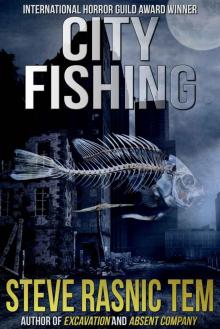 City Fishing
City Fishing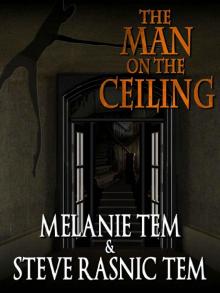 The Man on the Ceiling
The Man on the Ceiling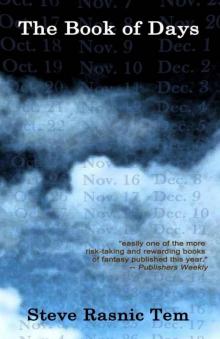 The Book of Days
The Book of Days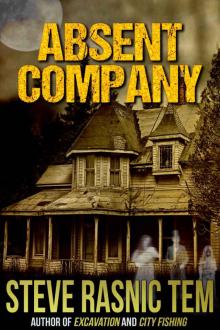 Absent Company
Absent Company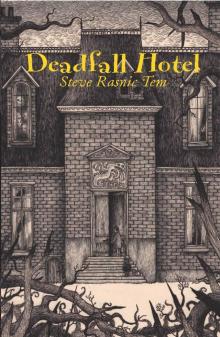 Deadfall Hotel
Deadfall Hotel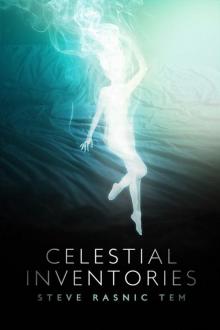 Celestial Inventories
Celestial Inventories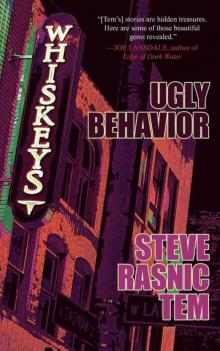 Ugly Behavior
Ugly Behavior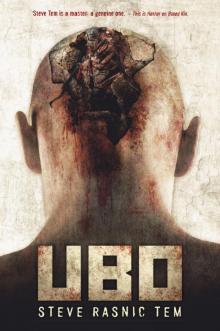 Ubo
Ubo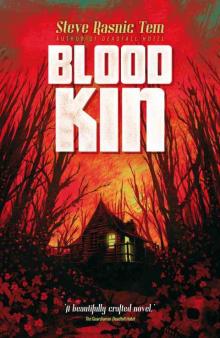 Blood Kin
Blood Kin